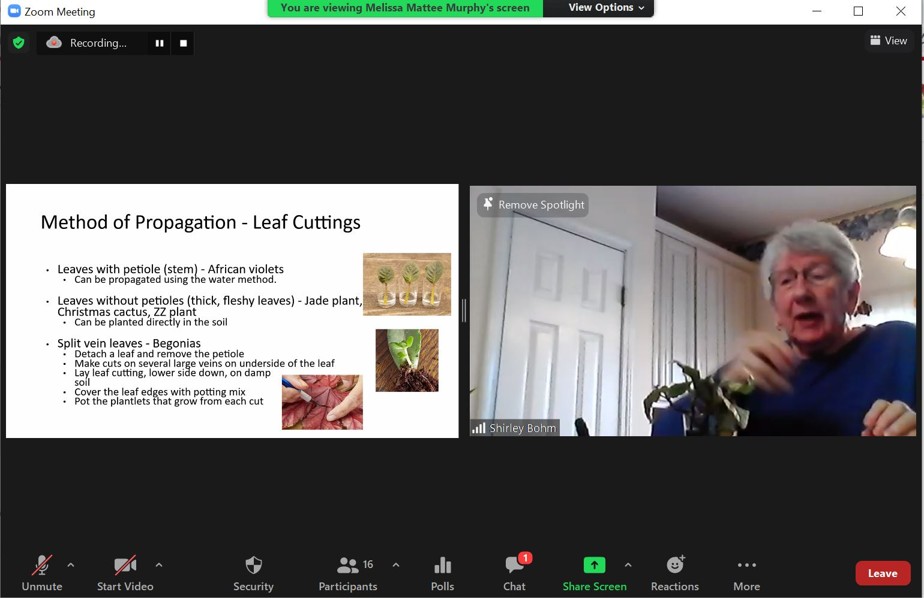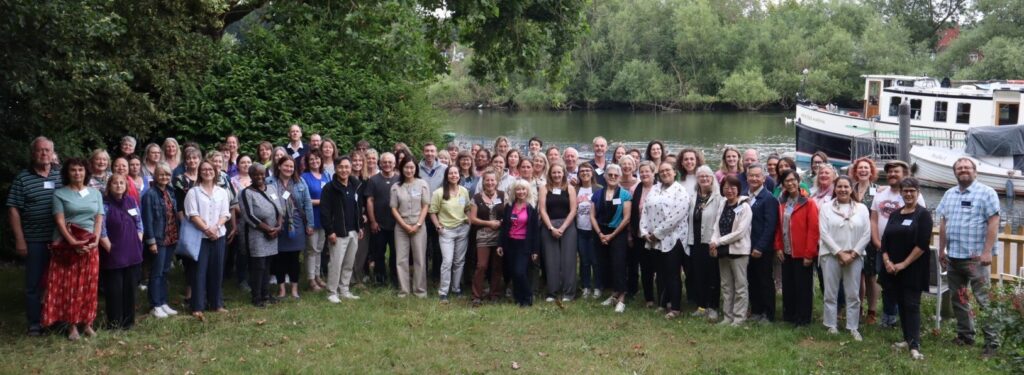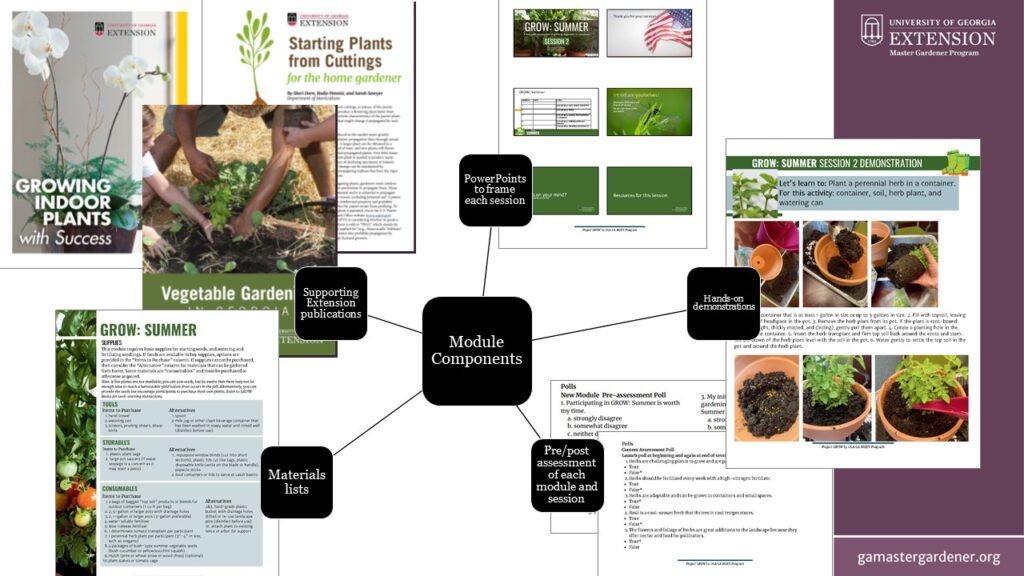One warm summer day in 2021, I happened to be sitting at my desk, working away, when the phone rang. I answered it, leaned in, and listened closely. I asked questions and took notes. Then, as in a classic Dr. Suess book, I had an idea!! Little did I know that this phone call and my “idea” was going to have so much impact on my work and take me to far-reaching places, like Reading, England!
The phone call came from a member of a medical team out of the Joseph Maxwell Cleland Veterans Affairs (VA) Hospital in Atlanta, though the caller actually worked with veterans at Fort McPherson in Fulton County. This team had obtained an internal Whole Health Innovation Grant and were interested in helping veterans improve their health. Their project was titled “Grow, Eat, Move” (we called it “G.E.M.” for short). In a broader approach to health, they wanted participants to learn to grow food, eat better by learning to prepare healthy dishes, and get moving with exercise. They called me for help with the gardening part, having been referred to me because of my role with the Georgia Master Gardener Program. No problem! We can teach people of any gardening experience level how to grow food. There was one caveat, though. It was 2021, and the VA was still not meeting in person. They needed a gardening class delivered virtually.
I told you I had an idea, so I set to work. Learning that the grant spanned the next year and that it was an ongoing effort to teach these health concepts to the intended audience, I knew that a plan was needed. Participants would come and go, jumping in at any time, so the plan had to allow for that. We needed to address very basic concepts of gardening, and probably need to repeat them throughout the year as new participants joined the program. We’d need breaks throughout the year, so we would work in short sessions that addressed seasonal gardening techniques. Voila! The idea led to a curriculum that spanned the seasons and included basic concepts. We threw in a bonus holiday unit, too!

When, in the course of the original conversation, this individual mentioned Fulton County, I immediately listed in my notes the need to reach out to the Extension team in Fulton. I am so glad that I did! This effort took a great deal of energy from both Extension personnel and volunteers. So much energy was needed, in fact, that I reached out to surrounding metro counties. Gwinnett and Fayette Extension responded with gusto, making great contributions to the project.
Project GROW was intended to address food insecurity by teaching the basics of growing food. We needed to equip each participant to grow edible food crops over the course of the 12-month project. Gardening efforts needed to allow for a range of settings, including low-light, interior settings and limited exterior settings, such as porches, patios, and sidewalks. We needed short lessons, hands-on activities, and presentations. We had to plan ahead far enough so that the VA staff could purchase the supplies for the hands-on activities, assemble individual kits, and get the supplies to participants before the new module started.
Did I mention that we offered GROW in a virtual setting? We needed extra hands to teach, to demonstrate, AND to video!! I am sure we have MGEVs with videography training and skills, but we didn’t know you when we were doing this project! We simply used what resources we had and got the job done. Often, one of the GROW team demonstrated from their computer station. Sometimes, I cleared my desk and Sarah used a smartphone camera to capture what I was doing with the plants and seeds.

In the end, our Extension team completed a monumental lift! Ten MGEVs reported more than 300 hours on this project. They attended weekly planning/rehearsal sessions on Fridays, then joined in the following week to present the sessions to the veterans. Five county personnel and myself worked together to recruit volunteers, run the weekly planning sessions, guide curriculum and demonstration development, and run weekly Zoom sessions (including assessment polls that measured well-being and increase in knowledge). Several volunteers and Extension personnel played key roles in writing the curriculum and crafting the hands-on demonstrations.
We worked closely with the VA medical team throughout the project. They advertised new modules to their clients, handled registration, ordered supplies, and assembled and delivered gardening kits. We all met once a week to plan the upcoming sessions. This project truly took all of us to get it done.
We were thrilled with the results. We had 128 military veterans participate cumulatively between October 2021 and July 2022. Many participated in more than one module. Participants grew food, like basil, lettuce, bush-type cucumbers, and determinate tomatoes, and shared pictures during the online sessions. One participant was so excited to grow plants despite not having any sun that he asked a neighbor if he could grow his plants on their sunny deck! Participants reported more confidence to go to a community garden to continue growing food.
This gardening project also offered a way to help veterans with health goals. According to the supervising Recreational Therapist, veterans increased participation in Whole Health programming because of connections made with other veterans in the virtual GROW sessions. Making these social connections encouraged participation in other VA events. In fact, veterans often reported that their most favorite part of the GROW sessions was meeting each week with other people interested in plants!
The story of this project has been shared in several places. In 2022, the medical team and I shared the Project GEM concept and preliminary results at a 2022 medical conference. I shared a poster about the gardening piece at the 2022 Extension Master Gardener National Coordinators’ Conference that we hosted here in Georgia. State and local Master Gardener program coordinators from all over the U.S. had a chance to learn about our efforts. In 2023, I shared more about the project at the International Master Gardener Conference in Overland Park, Kansas. This time, Master Gardeners and coordinators got a chance to hear more about our work. Then, in 2024, I shared an oral presentation about the project, its impact, and the resulting curriculum at the International People-Plant Symposium in Reading, England. I had no idea when I answered my office phone on that summer day just how far this effort would take us!

For Georgia MGEVs, Project GROW also resulted in a curriculum that is very useful for local programs. It offers a series of seasonal gardening lessons all planned out for you to use with a wide range of clients (not just veterans) in your local programming efforts. It can also be used in person, however it fits best with what you are trying to achieve. Each module (there are six in total) includes lessons, fully scripted presentations, hands-on demonstrations, and links to supporting Extension publications. We shared a sneak peek of the curriculum at the 2024 GMGA Conference last October. The curriculum is currently in the final stages of production.

To share this new curriculum with MGEVs, we are offering a series of Advanced Training sessions this year. MGEVs who attend the trainings will receive early copies of the featured module. If you are interested in learning more about the curriculum and how to use it, be sure to check out the 2025 AT schedule for upcoming dates and registration information!
***************
Many thanks to:
UGA Extension in Fayette, Fulton, and Gwinnett counties, including Lisa Klein, Cynthia McCrary, and Melissa Mattee Murphy.
Georgia Master Gardener Extension Volunteers in Fayette, Fulton, and Gwinnett counties, including Shirley Bohm, Vauna Bellury, Jim Brazeale, Jill Stillions, Larry Nicastro, Jody Watts, Jim Saleh, Joe Kong, Carolyn Christ, Kelley Hanada, Valda McCall, Kimberley Mincie, Thomas Thompson, Dolores Walker.
We could not have done it without you!
